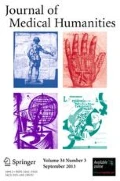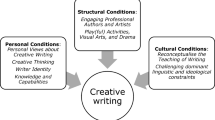Abstract
This paper examines definitions and uses of reflective and creative writing in health care education classrooms and professional development settings. A review of articles related to writing in health care reveals that when teaching narrative competence is the goal, creative writing may produce the best outcomes. Ultimately, the paper describes the importance of defining literary creative writing as a distinct form of writing and recommends scholars interested in using literary creative writing to teach narrative competence study pedagogy of the field.
Similar content being viewed by others
Notes
J.D. Engel et al., Narrative in health care. (New York: Radcliffe Medical PR, 2008), 167.
J. White, “The Use of Reflective Writing in Exploring Student Experiences in Surgery,” Journal of Surgical Education 7:1 (2008): 519.
T. Kind, V.R. Everett, and M. Ottolini, “Learning to Connect: Students’ Reflections on doctor-patient interactions,” Patient Education and Counseling 75 (2009): 149.
G.R. Westmoreland et al., “Improving Medical Student Attitudes Toward Older Patients Through a ‘Council of Elders’ and Reflective Writing Experience,” Journal of the American Geriatric Society 57 (2009): 315.
R. Campo, “Why Should Medical Students Be Writing Poems?” Journal of Medical Humanities 27 (2006): 254.
A. Reisman, H. Hansen, and A. Rastegar, “The Craft of Writing: A Physician-Writer’s Workshop for Resident Physicians,” Journal of General Internal Medicine 21 (2006): 1109.
Ibid, 1111.
W. Foster and E. Freeman, “Poetry in General Practice Education: Perceptions of Learners,” Family Practice 25 (2005): 295.
Reisman, Hansen, and Rastegar, 1111.
Foster and Freeman, 298.
J. Shapiro and H. Stein, “Poetic Licence: Writing Poetry as a Way for Medical Students to Examine Their Professional Relational Systems,” Families, Systems, and Health 23 (2005): 279.
12. V. Holmes, “Writing Poetry: A Way of Knowing Nursing,” Journal of Advanced Nursing 28:6 (1998): 1191.
Ibid, 1192.
S. Young, “Beyond ‘Hot Lips’ and ‘Big Nurse’: Creative Writing and Nursing,” Composition Studies 33: 1 (2005): 80.
F. Sampson and A. Visser, “Creative Writing in Health Care: A Branch of Complementary Medicine,” Patient Education and Counseling 57:1 (2005): 3.
S.E. Gull, R. O’Flynn, and J.Y.L Hunter, “Creative Writing Workshops for Medical Education: Learning from a Pilot Study with Hospital Staff,” Journal of Medical Ethics: Medical Humanities 28 (2002): 104.
Ibid., 104.
S. Nicholls, “Beyond Expressive Writing: Evolving Models of Developmental Creative Writing,” Journal of Health Psychology 14:2 (2009): 176.
S. DasGupta and R. Charon, “Personal Illness Narratives: Using Reflective Writing to Teach Empathy,” Academic Medicine 79: 4 (2004): 352.
Ibid., 353.
N. Kuhl, “Personal Therapeutic Writing vs. Literary Writing,” Power and Identity in the Creative Writing Classroom (Buffalo: Multilingual Matters, 2005), 4.
Ibid., 11.
R. Charon, Narrative Medicine: Honoring the Stories of Illness (Oxford: Oxford University Press, 2006), 113.
V. Bonebakker, “Literature and Medicine: Humanities at the Heart of Health Care: A Hospital-Based Reading and Discussion Program Developed by the Maine Humanities Council,” Academic Medicine 78:10 (2003), 966.
References
Bishop, W and H Ostrom, eds. Colors of a Different Horse: Rethinking Creative Writing Theory and Pedagogy. Urbana: NCTE, 1994.
Bonnebaker, V. “Literature and Medicine: Humanities at the Heart of Health Care: A Hospital-based Reading and Discussion Program Developed by the Maine Humanities Council.” Academic Medicine, 78(2003): 963-967.
Cameron, J. The Artist’s Way: A Spiritual Path to Higher Creativity. New York: Perigree,1992.
Campo, R. “Why Should Medical Students Be Writing Poems?” Journal of Medical Humanities, 27 (2006): 253-254.
Charon, R. Narrative Medicine: Honoring the Stories of Illness. Oxford: Oxford University Press, 2006.
DasGupta, S and R Charon. “Personal Illness Narratives: Using Reflective Writing to Teach Empathy.” Academic Medicine, 79 (2004): 351-356.
Engel, JD, Zarconi J, Pethtel LL, and SA Missimi. Narrative in Health Care. New York: Radcliffe Medical PR, 2008.
Foster, W and E Freeman. “Poetry in General Practice Education: Perceptions of Learners.” Family Practice, 25 (2008): 294-303.
Gull, S E, R O’Flynn, and JYL Hunter. “Creative Writing Workshops for Medical Education: Learning from a Pilot Study with Hospital Staff.” Journal of Medical Ethics: Medical Humanities, 28 (2002): 102-104.
Holmes, V and D Gregory. “Writing Poetry: A Way of Knowing Nursing.” Journal of Advanced Nursing, 28 (1998): 1191-1194.
Kind, T, VR Everett, and M Ottolini. “Learning to Connect: Students’ Reflections on Doctor-patient Interactions.” Patient and Education Counseling, 75 (2009): 149- 154.
Kuhl, N. “Personal Therapeutic Writing vs. Literary Writing.” In Power and Identity in the Creative Writing Classroom, ed. Anna Leahy. Buffalo: Multilingual Matters, 2005.
Leahy, A, ed. Power and Identity in the Creative Writing Classroom. Buffalo: Multilingual Matters, 2005.
Nicholls, S. “Beyond Expressive Writing: Evolving Models of Developmental Creative Writing.” Journal of Health Psychology, 14 (2009): 171-180.
Samson, F and A Visser. “Creative Writing in Health Care: A Branch of Complementary Medicine.” Patient Education and Counseling, 57 (2005): 1-4.
Shapiro, J and H Stein. “Poetic License: Writing Poetry as a Way for Medical Students to Examine Their Professional Relational Systems. Families, Systems, and Health 23 (2005): 278-292.
Westmoreland et al. “Improving Medical Student Attitudes Toward Older Patients through a “Council of Elders” and Reflective Writing Experience.” Education and Training, 57 (2009): 315-320.
White, J. “The Use of Reflective Writing in Exploring Student Experiences in Surgery.” Journal of Surgical Education, 65 (2008): 518-520.
Young, S. “Beyond ‘Hot Lips’ and ‘Big Nurse’: Creative Writing and Nursing.” Composition Studies, 33 (2005): 75-91.
Author information
Authors and Affiliations
Corresponding author
Rights and permissions
About this article
Cite this article
Kerr, L. More than Words: Applying the Discipline of Literary Creative Writing to the Practice of Reflective Writing in Health Care Education. J Med Humanit 31, 295–301 (2010). https://doi.org/10.1007/s10912-010-9120-6
Published:
Issue Date:
DOI: https://doi.org/10.1007/s10912-010-9120-6



